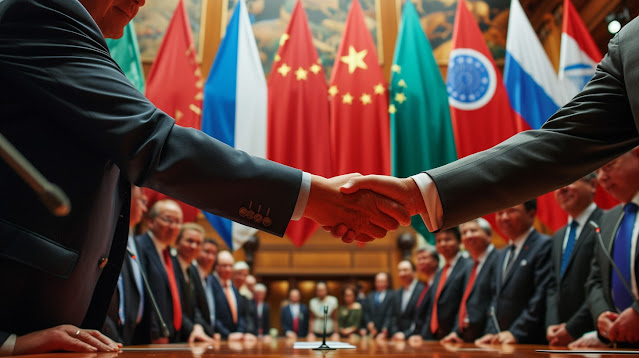Submit Review: The Ethics of Military Intervention in the Name of Democracy and Human Rights
The Ethics of Military Intervention in the Name of Democracy and Human Rights
Historical Context and Key Interventions
Military interventions have been a feature of global politics for centuries. However, the justifications and methodologies have evolved, particularly post-World War II, with an increased focus on humanitarian motives.
Notable Historical Interventions
- Vietnam War (1955-1975): The United States' intervention aimed at curbing the spread of communism in Southeast Asia, which resulted in massive civilian casualties and long-term socio-political instability in the region.
- Kosovo War (1998-1999): NATO's intervention to halt ethnic cleansing and human rights abuses by Serbian forces. This intervention is often cited as a success in terms of its humanitarian goals but also faced criticism for bypassing the UN Security Council.
- Iraq War (2003): The U.S.-led invasion intended to topple Saddam Hussein's regime and establish democracy. This intervention remains highly controversial due to its questionable legitimacy, the resulting chaos, and the rise of extremist groups like ISIS.
- Ethical Considerations
Sovereignty vs. Human Rights
One of the core ethical dilemmas is the tension between respecting state sovereignty and the imperative to protect human rights.
- State Sovereignty: A fundamental principle of international law that respects a nation's right to govern itself without external interference.
- Human Rights: The moral obligation to intervene in situations where there are gross violations of human rights, such as genocide, war crimes, and crimes against humanity.
Just War Theory
Just War Theory offers a framework to evaluate the morality of military interventions. Key principles include:
- Just Cause: The intervention must address a serious threat, such as preventing a humanitarian disaster.
- Legitimate Authority: The decision to intervene should be made by a legitimate authority, preferably an international body like the United Nations.
- Right Intention: The primary motive should be to alleviate human suffering, not to pursue self-interest.
- Proportionality: The scale and intensity of the intervention should be proportional to the threat.
- Last Resort: Military intervention should only be considered after all other options have been exhausted.
Controversies and Criticisms
Unintended Consequences
Military interventions, even with the best intentions, often lead to unintended and adverse outcomes:
- Civilian Casualties: Despite efforts to minimize harm, civilian casualties are almost inevitable in military conflicts.
- Destabilization: Removing a regime can create a power vacuum, leading to prolonged instability and civil strife, as seen in Libya and Iraq.
- Humanitarian Crisis: Interventions can exacerbate humanitarian crises, leading to massive displacements and suffering.
Motivations and Legitimacy
The legitimacy of military interventions is frequently questioned due to the perceived underlying motivations:
- Hidden Agendas: Critics argue that interventions are often driven by political, economic, or strategic interests rather than genuine humanitarian concerns.
- Selective Interventions: The inconsistency in choosing which conflicts to intervene in raises questions about impartiality and fairness. For instance, why intervene in Libya but not in Syria?
- Creating Solutions
Strengthening International Law and Institutions
A robust international legal framework is crucial for regulating military interventions:
- United Nations Reforms: Strengthening the role and capacity of the United Nations to authorize and oversee interventions can enhance legitimacy and accountability.
- Clear Criteria: Establishing transparent and universally accepted criteria for intervention, based on principles like those in Just War Theory, can help ensure that interventions are justified and proportionate.
Enhancing Transparency and Accountability
Improving transparency and accountability can address many ethical concerns:
- Independent Oversight: Establishing independent bodies to monitor and report on interventions can enhance credibility and accountability.
- Public Reporting: Transparent reporting of the motivations, processes, and outcomes of interventions can build trust and legitimacy.
Promoting Non-Military Solutions
Prioritizing non-military solutions can often prevent conflicts and human rights abuses more effectively:
- Diplomacy and Mediation: Engaging in diplomatic efforts and mediation to resolve conflicts peacefully should always be the first approach.
- Economic Sanctions: Implementing targeted economic sanctions to pressure regimes can be an effective non-military tool.
- Humanitarian Aid: Providing humanitarian aid to address the root causes of conflict and human rights abuses can reduce the need for military intervention.
Supporting Local Governance and Development
Empowering local governance and supporting development initiatives can create sustainable solutions:
- Capacity Building: Strengthening local institutions and governance structures to handle internal conflicts and human rights issues.
- Development Aid: Providing development aid to improve economic conditions and reduce the likelihood of conflict.
Case Studies
Kosovo War
NATO's intervention in Kosovo is often cited as a successful example of humanitarian intervention. The primary aim was to halt ethnic cleansing and severe human rights abuses by Serbian forces. Despite bypassing the UN Security Council, the intervention was largely successful in achieving its humanitarian goals. However, it also highlighted the need for clearer international legal frameworks for such actions.
Iraq War
The 2003 invasion of Iraq, led by the United States, intended to remove Saddam Hussein and establish a democratic government. The intervention has been widely criticized for its legitimacy, execution, and long-term consequences. The resulting instability and the rise of extremist groups like ISIS exemplify the dangers of poorly planned and executed military interventions.
Conclusion
The ethics of military intervention in the name of democracy and human rights are complex and multifaceted. While such interventions can be justified under certain conditions, they often lead to significant ethical dilemmas and unintended consequences. By strengthening international law, enhancing accountability, promoting non-military solutions, and supporting local governance and development, the global community can address these challenges more effectively. Thoughtful and principled approaches are essential to protect human rights and promote democracy without causing undue harm or destabilizing regions.













Comments
Post a Comment